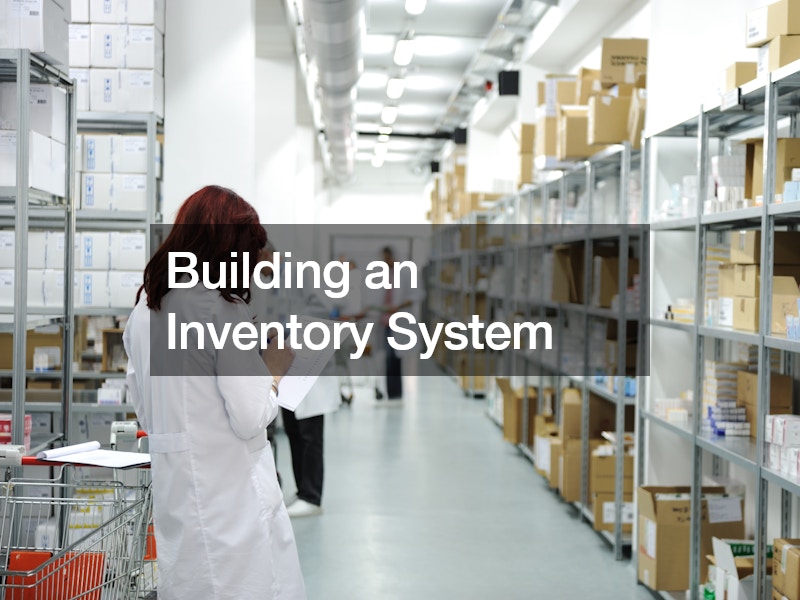
Where Do You Even Begin
Starting a new retail business can be an exciting and challenging endeavor. Crafting a comprehensive and well-thought-out overall plan is essential for ensuring success and sustainability. An effective plan helps you understand your market, manage your resources, and set realistic goals. By methodically addressing each critical component of your business, you can build a strong foundation that will support growth and adaptation in the competitive retail landscape. This blog will guide you through the essential steps to create an overall plan for your new retail business, providing practical tips and insights to help you navigate the journey from concept to execution.

Identifying Your Target Market
Understanding your target market is a fundamental step in developing an effective overall plan for your retail business. Your target market comprises the group of consumers most likely to purchase your products or services. Identifying this group involves researching demographics, purchasing behaviors, and preferences. By gaining a deep understanding of your potential customers, you can tailor your marketing strategies, product offerings, and overall business approach to meet their needs. This not only helps in attracting the right customers but also in building long-term relationships and loyalty.
In a more specific context, leveraging social media marketing can significantly enhance your ability to identify and engage with your target market. Social media platforms offer a wealth of data and insights into consumer behavior, interests, and demographics. Utilizing these tools, you can create targeted advertising campaigns, interact directly with potential customers, and gather feedback to refine your offerings. Incorporating social media marketing into your overall plan ensures that you stay connected with your audience and can quickly adapt to their evolving needs and preferences.
Conducting Market Research
Conducting thorough market research is another crucial element of crafting your overall plan. Market research involves collecting and analyzing data about your industry, competitors, and potential customers. This information helps you understand market trends, identify opportunities, and mitigate risks. Comprehensive market research provides the foundation for making informed decisions about product development, pricing, marketing strategies, and other key aspects of your business. It enables you to anticipate challenges and position your retail business to take advantage of market gaps and emerging trends.
On a more specific level, utilizing local maps can be incredibly beneficial when conducting market research for a retail business. Local maps can help you visualize the geographic distribution of your target market, identify high-traffic areas, and evaluate the proximity of competitors. By analyzing this spatial data, you can make strategic decisions about where to locate your store, how to optimize your marketing efforts, and where to allocate resources for maximum impact. Integrating local maps into your overall plan ensures that your market research is grounded in real-world, actionable insights that can drive your business’s success.

Developing a Business Plan
Creating a detailed business plan is essential for the success of your retail business. A business plan outlines your business goals, strategies, and the steps needed to achieve them. It serves as a roadmap for your business, guiding your decisions and helping you stay on track. Your business plan should include an executive summary, a description of your business, market analysis, organizational structure, product line, marketing and sales strategies, funding requirements, and financial projections. A well-crafted business plan not only helps you clarify your vision but also attracts investors and partners by demonstrating the viability and potential of your business.
When developing your business plan, consider consulting with a design build company. These companies can provide valuable insights into the physical aspects of your retail space, ensuring that your store layout is optimized for customer flow and product display. Their expertise can help you create an inviting and efficient retail environment that enhances the shopping experience. Incorporating the recommendations of a design-build company into your overall plan ensures that every aspect of your business, from the physical space to the operational strategies, is aligned with your goals and designed for success.
Setting Clear Business Goals
Setting clear, measurable business goals is a critical component of your overall plan. These goals provide direction and motivation, helping you focus your efforts and resources on achieving specific outcomes. Business goals can be short-term, such as increasing monthly sales, or long-term, like expanding to multiple locations. The key is to make your goals SMART: Specific, Measurable, Achievable, Relevant, and Time-bound. Clear goals help you track your progress, make informed decisions, and adjust your strategies as needed to stay on course.
In more specific terms, setting business goals can benefit greatly from web development detailing. By establishing clear online objectives, such as improving website traffic, increasing online sales, or enhancing user engagement, you can create a digital strategy that complements your retail operations. Detailed web development plans ensure that your online presence is robust, user-friendly, and aligned with your overall business goals. Integrating web development detailing into your overall plan helps you leverage digital tools and platforms to achieve your business objectives and drive growth.

Establishing a Budget
Establishing a budget is a fundamental step in your overall plan, ensuring that your retail business operates within its financial means. A comprehensive budget outlines your expected income and expenses, helping you allocate resources efficiently and avoid overspending. Key components of a budget include initial startup costs, operating expenses, marketing costs, and contingencies for unexpected expenses. Regularly reviewing and adjusting your budget allows you to stay on top of your financial health and make informed decisions about investments and expenditures.
For a more detailed approach, consider the insights provided by commercial water damage repair services when establishing your budget. These services can help you understand the potential costs associated with maintaining and repairing your retail space, particularly in the event of water damage. By factoring in these potential expenses, you can create a more accurate and realistic budget that accounts for unexpected repairs and maintenance. Incorporating commercial water damage repair considerations into your overall plan ensures that you are prepared for unforeseen challenges and can maintain the integrity and safety of your retail environment.
Choosing the Right Location
Selecting the right location for your retail business is a critical factor in your overall plan. The location you choose can significantly impact foot traffic, visibility, and ultimately, your sales. When considering potential locations, think about accessibility, the surrounding area, and the presence of complementary businesses. An ideal location is convenient for your target market, easily accessible by various modes of transportation, and situated in an area that aligns with your brand image and customer expectations.
In more specific terms, working with a window installation company can enhance the attractiveness and functionality of your chosen location. High-quality windows can improve the curb appeal of your store, drawing in potential customers with inviting displays and natural light. Additionally, energy-efficient windows can help reduce heating and cooling costs, contributing to a more sustainable and cost-effective operation. Including window installation considerations in your overall plan ensures that your retail space is both visually appealing and operationally efficient, enhancing the overall customer experience.
Creating a Marketing Strategy
Developing a robust marketing strategy is essential for attracting and retaining customers in your retail business. Your marketing strategy should outline how you plan to promote your products or services, reach your target audience, and differentiate your business from competitors. Key components include defining your unique selling proposition (USP), selecting the appropriate marketing channels, and setting a marketing budget. A well-executed marketing strategy helps build brand awareness, drive sales, and establish a loyal customer base.
When crafting your marketing strategy, consider the importance of trademark protection services. Protecting your brand’s trademarks ensures that your unique brand identity is legally safeguarded against infringement. This protection allows you to confidently invest in marketing efforts, knowing that your brand elements—such as logos, slogans, and product names—are secure. Incorporating trademark protection services into your overall plan not only preserves your brand’s integrity but also adds value to your marketing initiatives, reinforcing your brand’s presence in the market.

Building an Inventory System
Establishing an efficient inventory system is a crucial aspect of your overall plan for a retail business. An effective inventory system helps you manage stock levels, reduce waste, and ensure that popular items are always available for customers. Key components of an inventory system include inventory tracking software, regular stock audits, and clear processes for ordering and restocking products. A well-managed inventory system enhances operational efficiency, reduces costs, and improves customer satisfaction by minimizing out-of-stock situations.
To be more specific, partnering with an adhesive coating manufacturer can optimize your inventory management. By sourcing high-quality adhesive products directly from the manufacturer, you can ensure a consistent supply and potentially negotiate better pricing. This partnership allows you to maintain optimal stock levels, reduce lead times, and ensure that your products meet quality standards. Integrating this relationship into your overall plan helps streamline your inventory processes, ensuring that your retail business operates smoothly and efficiently.
Hiring and Training Staff
Hiring and training staff is a vital component of your overall plan for your retail business. The quality and dedication of your employees directly impact customer service, operational efficiency, and overall business success. When hiring, look for individuals who not only have the necessary skills and experience but also align with your company’s values and culture. Providing comprehensive training ensures that your staff is well-prepared to handle their responsibilities and deliver exceptional customer service. Ongoing training and development opportunities keep your team motivated and equipped to adapt to changing business needs.
In a more specific context, incorporating new HVAC installation considerations into your staff training can enhance your store’s environment and customer experience. A comfortable and well-regulated climate makes your retail space more inviting, which can encourage customers to spend more time in your store. Training your staff on how to manage and maintain the HVAC system ensures that it operates efficiently, minimizing downtime and reducing energy costs. Including new HVAC installation and maintenance in your overall plan supports a pleasant shopping environment and a smooth operational workflow.
Monitoring and Adjusting Your Plan
Continuously monitoring and adjusting your overall plan is essential for the long-term success of your retail business. Regularly reviewing your business performance, market trends, and customer feedback helps you identify areas for improvement and opportunities for growth. Being adaptable and willing to make necessary changes ensures that your business remains competitive and responsive to the evolving market landscape. Effective monitoring involves setting key performance indicators (KPIs), conducting regular reviews, and implementing feedback loops to inform decision-making.
In more specific terms, working with an epoxy flooring company can play a role in maintaining and adjusting your retail space to meet changing needs. High-quality epoxy flooring can enhance the durability and appearance of your store, making it more attractive to customers. It’s also easier to clean and maintain, which can reduce long-term maintenance costs. By including considerations like epoxy flooring in your overall plan, you can ensure that your retail environment remains appealing and functional, supporting the ongoing success of your business.
Now You’re In Business
Crafting a comprehensive overall plan is crucial for the success and sustainability of your new retail business. By systematically addressing key components such as identifying your target market, conducting market research, developing a business plan, setting clear business goals, establishing a budget, choosing the right location, creating a marketing strategy, building an inventory system, hiring and training staff, and monitoring and adjusting your plan, you can create a solid foundation for growth and adaptation. Each step contributes to a well-rounded strategy that helps you navigate the complexities of the retail industry.
By incorporating specific elements like social media marketing, local maps, design-build companies, web development detailing, commercial water damage repair, window installation, trademark protection services, adhesive coating manufacturers, new HVAC installation, and epoxy flooring companies into your overall plan, you can ensure that every aspect of your business is optimized for success. This thorough approach not only prepares you for the challenges ahead but also positions your retail business to thrive in a competitive market. Remember, the key to a successful retail business lies in careful planning, continuous improvement, and a commitment to providing exceptional value to your customers.



